This post may contain ads and affiliate links and we may earn a small commission when you click on the links at no additional cost to you. As an Amazon Affiliate, we earn from qualifying purchases. You can read our full disclaimer here.
Why Is My Goldendoodle so Clingy? Breed Traits to Training Tips
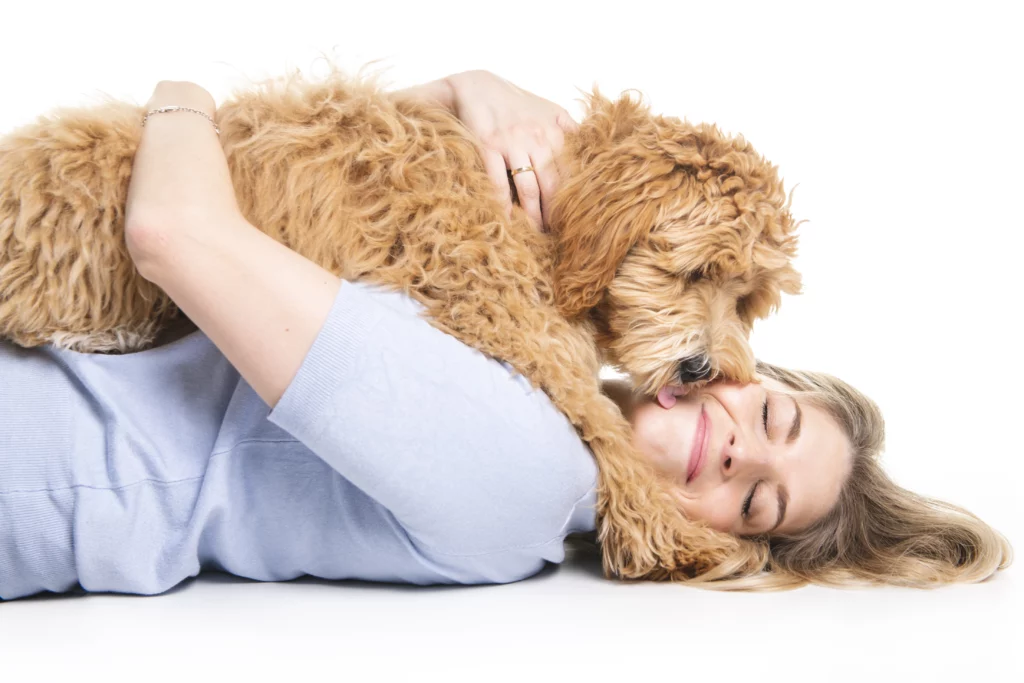
Why is my Goldendoodle so clingy? Many Goldendoodle owners find themselves pondering this question.
Clinginess, that undeniable urge our furry friends have to stick close, seems to be a trait some Goldendoodles just can’t shake.
It’s not just about being cute or seeking attention. Sometimes, it’s deeper.
Meet Gunner: My Reason for Asking, Why is my Goldendoodle so Clingy?
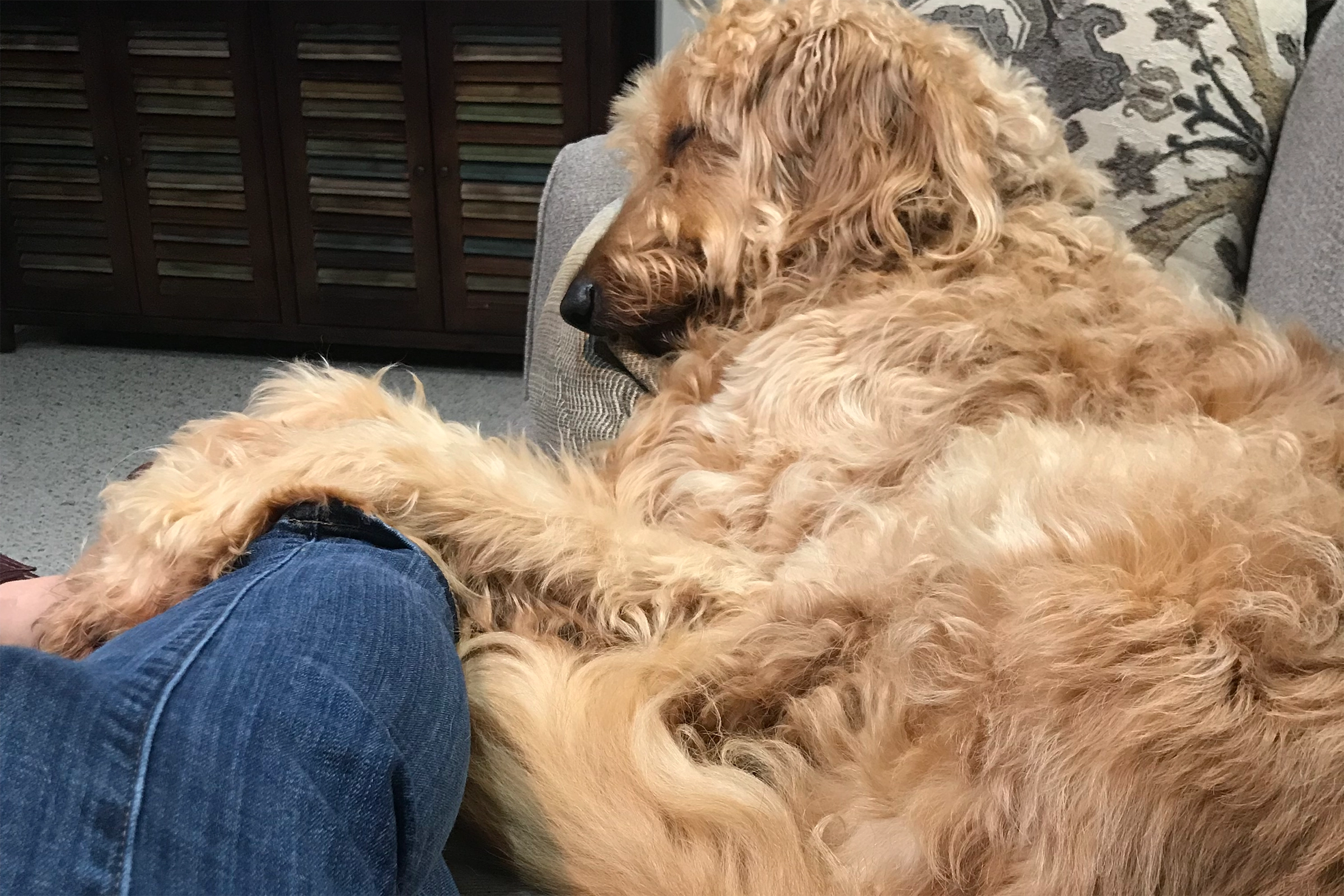
Let me introduce you to Gunner, my loyal 10-year-old Goldendoodle. A prime example of this behavior, Gunner has his unique way of showcasing his attachment.
Picture this: The door stands ajar, the outside world beckoning. Yet, Gunner hesitates. He won’t venture out unless I accompany him. Yes, he wants that open door, but he wants our bond to lead the way more.
10 Telltale Signs of a Clingy Goldendoodle
Goldendoodles, with their affectionate nature, often wear their hearts on their furry sleeves. Recognizing a clingy Goldendoodle isn’t just about spotting one obvious behavior; it’s about piecing together various subtle signs.
Here are ten indicators that your Goldendoodle might be leaning toward the clingy side:
- Shadowing You: Your Goldendoodle follows you everywhere, from the kitchen to the bathroom, almost like your furry little shadow.
- Reluctance to Be Alone: They show signs of distress when left by themselves, even for a short duration.
- Overly Excited Greetings: An overwhelming display of excitement, jumping, and whining even if you’ve been away for just a few minutes.
- Needing Physical Contact: They constantly seek physical touch, whether it’s nuzzling, pawing, or leaning against you.
- Distress During Separations: Vocalizing, howling, or barking excessively when you’re not in sight.
- Intrusive Sleeping Habits: Preferring to sleep very close to you or even on you, often seeking the warmth and comfort of your presence.
- Constant Eye Contact: They frequently check on you by maintaining eye contact, ensuring you’re still within their sight.
- Hesitation in Exploring: When outside or in new environments, they’re hesitant to venture too far from your side.
- Interrupting Tasks: If you’re working or engaged in an activity, they’ll try to grab your attention, often by placing a toy in your lap or pawing at you.
- Excessive Licking: While licking can be a sign of affection, overly frequent or anxious licking can be an indication of their attachment and dependence on you.
Recognizing these signs in your Goldendoodle is the first step. Understanding and managing clinginess ensures a healthy, happy bond between you and your furry companion.
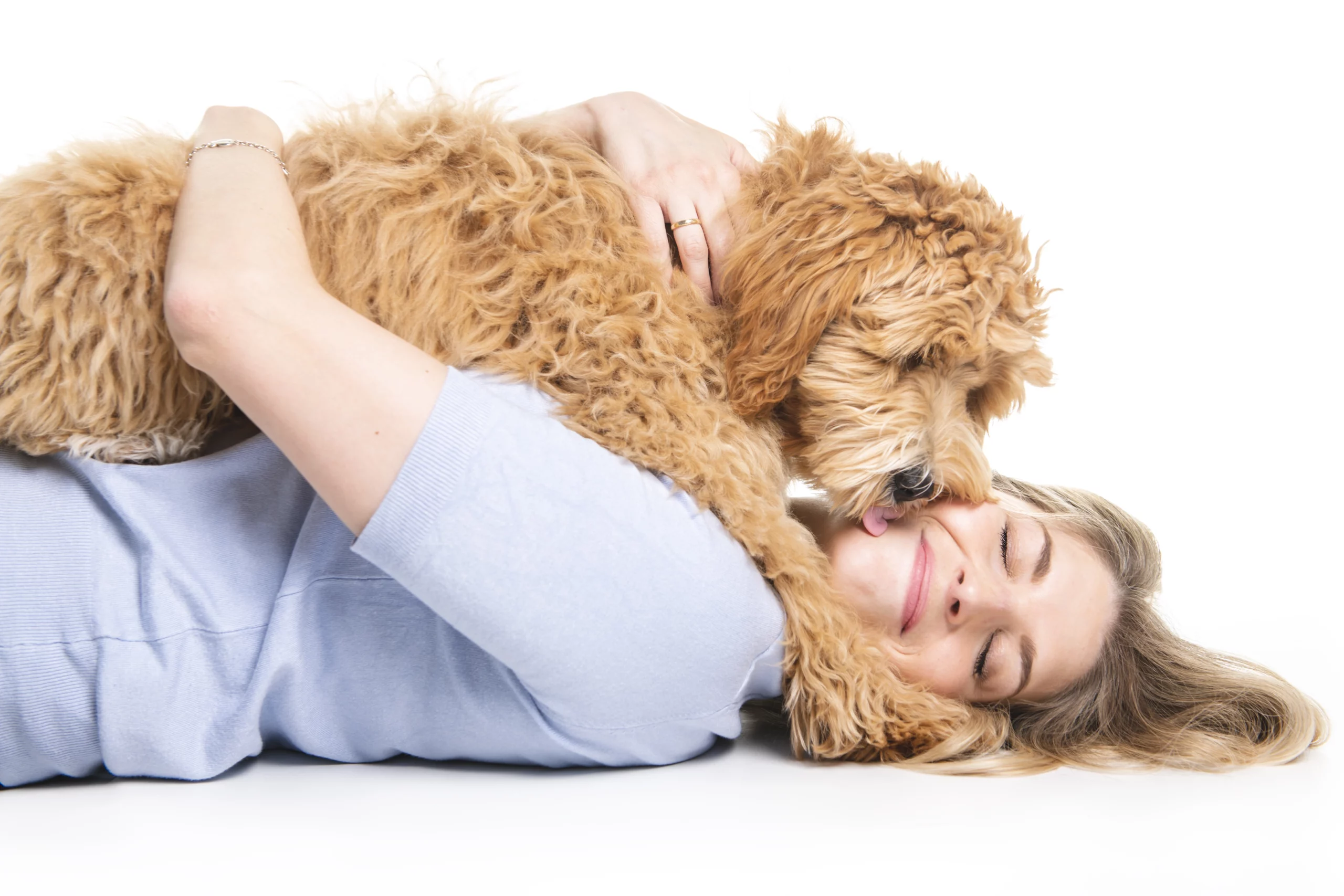
Understanding the Goldendoodle Breed: Why is My Goldendoodle So Clingy?
Exploring their origin and inherent traits can shed light on their clingy behavior and deepen our bond with these lovable companions.
A Glimpse into Goldendoodle History
Why is my Goldendoodle so clingy? To answer that, let’s first dive into their history. Goldendoodles are a delightful blend of the Golden Retriever and Poodle breeds.
They emerged in the 1990s, aiming to combine the best of both parent breeds. Goldendoodles quickly grew in popularity, and it’s no surprise why.
Goldendoodle Characteristics: A Trio of Traits
Three main character traits shine in Goldendoodles:
- Intelligence: Originating from two smart breeds, Goldendoodles often exhibit keen intelligence. They learn fast and think faster.
- Affection: If you’ve ever been greeted by a Goldendoodle’s wagging tail and excited yips, you know they ooze affection. They wear their heart on their furry sleeves.
- Loyalty: Perhaps this ties back to our central question. Goldendoodles are fiercely loyal, often forming strong bonds with their families.
The Breed’s Impact on Behavior
These traits don’t just make them lovable companions. They influence behavior. An intelligent dog thinks and perceives more, an affectionate one seeks close bonds, and a loyal one?
Well, they stick by your side, just like Gunner by the door.
Potential Reasons for Clinginess in Goldendoodles: Why is My Goldendoodle So Clingy?
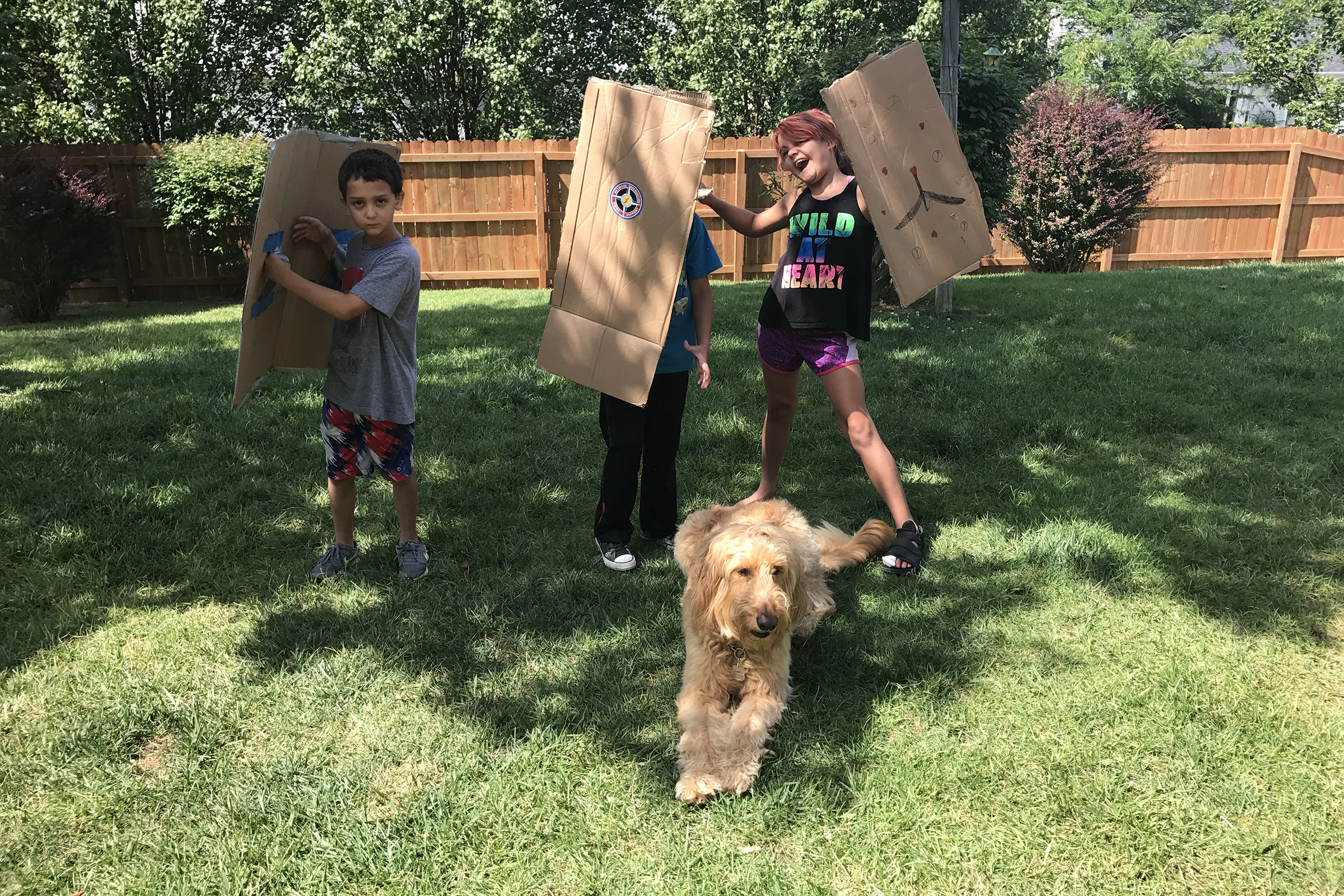
By exploring their genetic makeup, early life experiences, and potential health issues, we aim to provide insights into their unique, often clingy, demeanor.
Breed-specific Traits and Their Influence
Goldendoodles, a delightful mix of the Golden Retriever and Poodle, naturally inherit a set of characteristics that can influence their attachment behavior.
Both parent breeds have certain traits that, when combined, could make the perfect storm for a clingy companion.
- Golden Retriever’s Loyalty: Known for their unwavering loyalty, Golden Retrievers often form deep bonds with their families. This strong sense of attachment can certainly pass down to the Goldendoodle offspring.
- Poodle’s Intelligence: Poodles are renowned for their sharp intellect. This intelligence often translates into heightened sensitivity and awareness. A smart dog might be more attuned to changes in their environment or shifts in their owner’s mood, leading to potential clinginess as they respond to these cues.
The Role of Early Life and Socialization
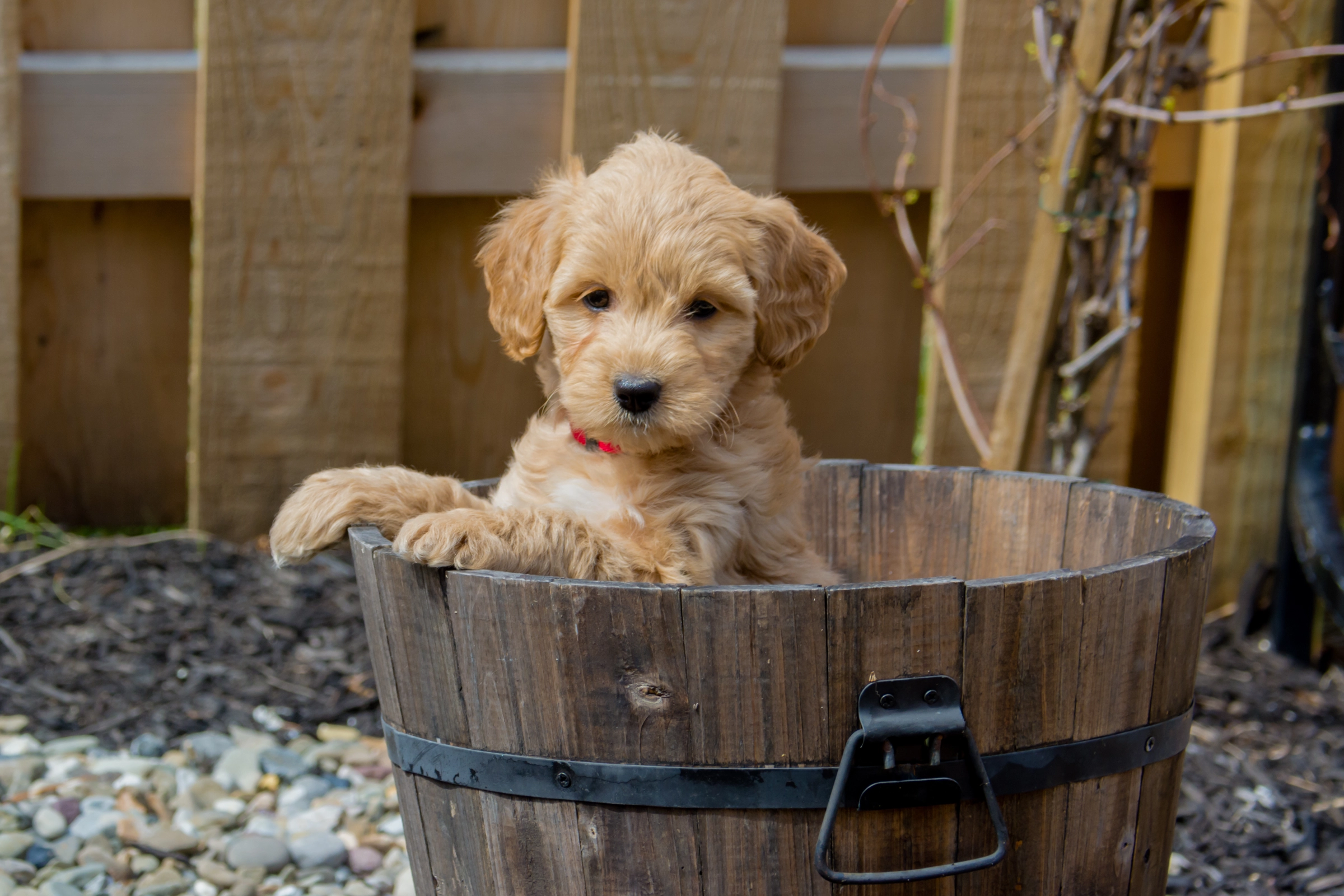
The foundational months of a Goldendoodle’s life are pivotal in shaping their behavior. Just as humans are products of their upbringing, so are these fluffy companions.
- Early Separation: Puppies taken away too soon from their mothers or siblings might develop attachment issues. They could compensate for this early separation by getting overly attached to their human families.
- Lack of Socialization: A Goldendoodle that hasn’t been exposed to various environments, people, or other animals might feel anxious or unsure in unfamiliar situations, leading them to cling to what they know best – their owner.
Separation Anxiety: Not Just Missing Their Human
Diving deeper into the query, “why is my Goldendoodle so clingy?”, we can’t overlook separation anxiety. This is not just about them missing you—it’s a genuine emotional distress.
- Tell-tale Signs: Excessive barking when you’re away, destructive behavior, restlessness, and even escape attempts can all signal separation anxiety. Addressing this early on is vital.
Environmental Factors and Their Impact
Goldendoodles thrive on routine and familiarity. Any shake-up in their usual environment can lead to uncertainty and anxiety.
- Change of Residence: Moving to a new house can be overwhelming for them.
- Addition to the Family: Be it a new pet or a baby, this can stir feelings of jealousy or insecurity.
- Routine Changes: Something as simple as a change in their walk or feeding schedule can unsettle them, pushing them to seek more reassurance from their owners.
Health Concerns: When Comfort is Key
Sometimes the answer to “why is my Goldendoodle so clingy?” is rooted in health. Just as we might seek comfort when we’re unwell, Goldendoodles do the same.
- Underlying Health Issues: Conditions like joint pain, vision loss, or dental problems can lead to increased clinginess. Some Goldendoodles have sensitive stomachs too.
- Behavioral Indicators: Look out for a sudden increase in attachment behavior. It could be their way of communicating that something’s amiss. Regular vet check-ups are crucial in these instances.
You might like our post about the best supplements for Goldendoodles!
Training Tips to Manage and Reduce Clinginess: Why is My Goldendoodle So Clingy?
Let’s look into actionable strategies for addressing your Goldendoodles’s attachment behaviors. With the right techniques, you can boost their confidence and promote more independent behavior.
Building Independence: Cultivating a Confident Goldendoodle
“Why is my Goldendoodle so clingy?” you ask. An essential step to addressing this is fostering their independence. Independence doesn’t mean detachment; it means building confidence in your Goldendoodle to be okay even when you’re not around.
- Stay and Wait Exercises: Train your dog to sit and stay. Gradually increase the distance between you and your dog during these exercises.
- Solo Playtime: Introduce toys that can keep them occupied when alone. Puzzle toys are great for this purpose.
Desensitization and Counterconditioning: Reducing Alone-Time Anxiety
Anxiety often fuels clingy behavior. By using desensitization and counterconditioning techniques, we can help Goldendoodles associate alone time with positive experiences.
- Start Small: Leave them alone for very short intervals, gradually increasing the time.
- Positive Associations: Give them a special toy or treat when you’re away. They’ll start associating your absence with rewards.
Using Positive Reinforcements: Rewarding Independent Behavior
Using rewards effectively is pivotal. Positive reinforcement can do wonders in managing and reducing clinginess.
- Treats for Independence: Reward them when they play by themselves or when they remain calm as you step away.
- Praise Works: A simple “good job” can boost their confidence and reinforce desired behavior.
Setting a Routine: Predictability Equals Security
Goldendoodles, like most dogs, thrive on consistency. A set routine can make them feel secure and reduce the need for constant reassurance.
- Consistent Meal Times: Stick to regular feeding schedules. Predictable meal times help them feel secure.
- Regular Walks: Having a set time for walks, playtime, and rest can significantly stabilize their behavior.
By implementing these training tips, the question of “why is my Goldendoodle so clingy?” becomes easier to understand and address.
Gunner’s Bedtime Chronicles: Why is My Goldendoodle So Clingy at Night?
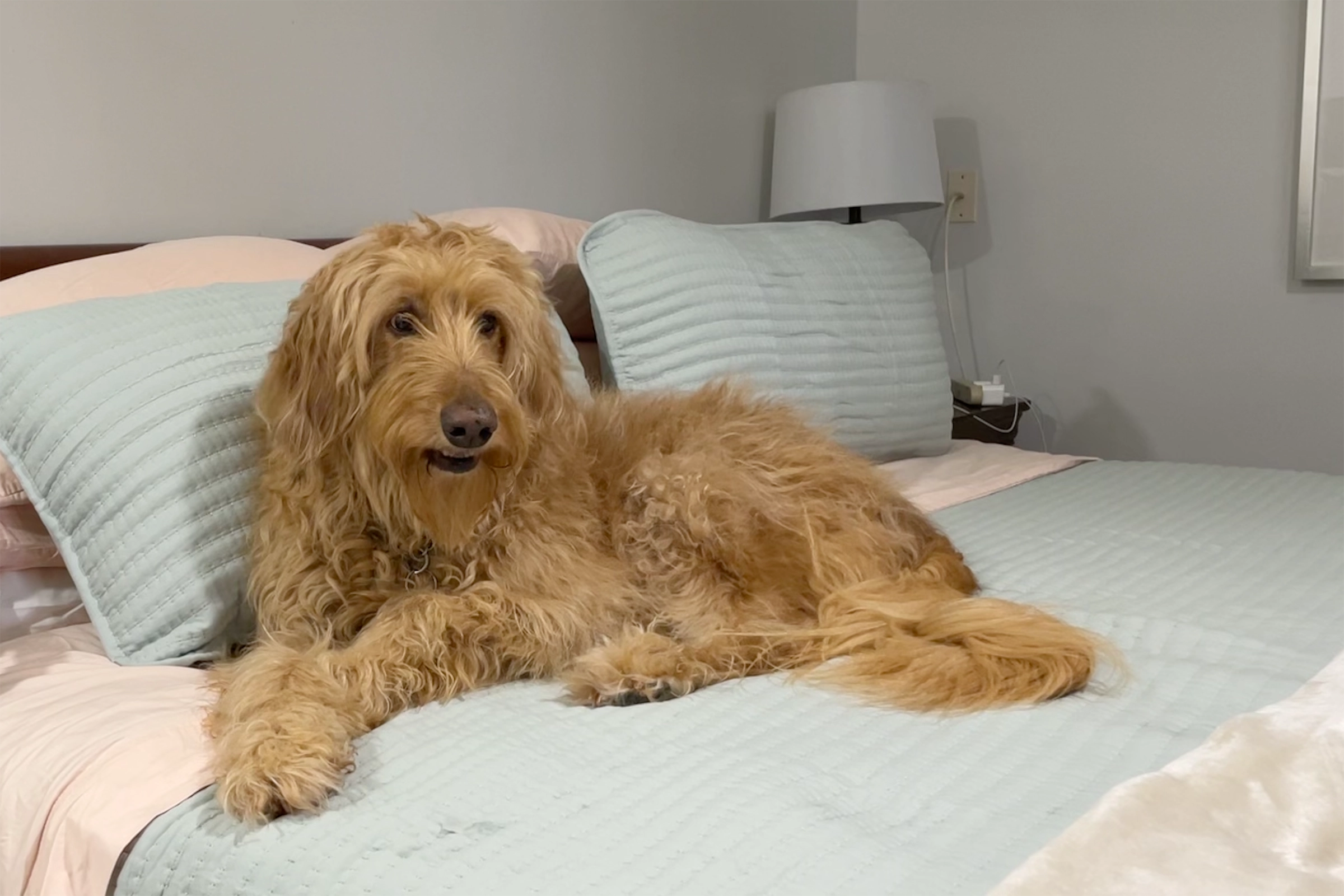
Owning a Goldendoodle isn’t just about the breed’s playful antics or their heart-melting eyes; it’s about the deep bond and quirks that come with it.
With Gunner, every day offers a mix of lessons and love-filled moments, especially when the sun sets.
Finding His Sweet Spot: The Middle of the Bed
As nighttime rolls around and the bed beckons, Gunner always has a particular preference. Like clockwork, he finds his designated spot snugly sandwiched between my husband and me.
Yes, we’re those dog parents – Gunner gets the royal treatment and is allowed to snuggle with us in bed. It’s our nightly ritual, and honestly, it’s hard to imagine bedtime any other way.
Gunner’s Midnight Check-ins
But there’s a particularly heartwarming behavior I’ve noticed. Gunner, even in the depths of sleep, will occasionally lift his head, scanning the bed with those soulful eyes, seeking me out.
The moment our eyes meet, there’s a brief second of acknowledgment – a silent “you’re still here” from him.
Almost instantly, his head plops back onto the pillow, and he drifts off, seemingly assured and comforted by my presence.
Our Goldendoodle Clings…but Cares
I hesitated to post this picture below. But it is so sweet, I had to. That’s my husband in a hospital bed at home. He was quite ill for many months and after this was in the hospital and a nursing home for eight months.
He is a disabled Vietnam veteran. Gunner would not leave his side. He even squeezed himself into this small hospital bed to be by him. I wouldn’t call it clingy as much as caring.
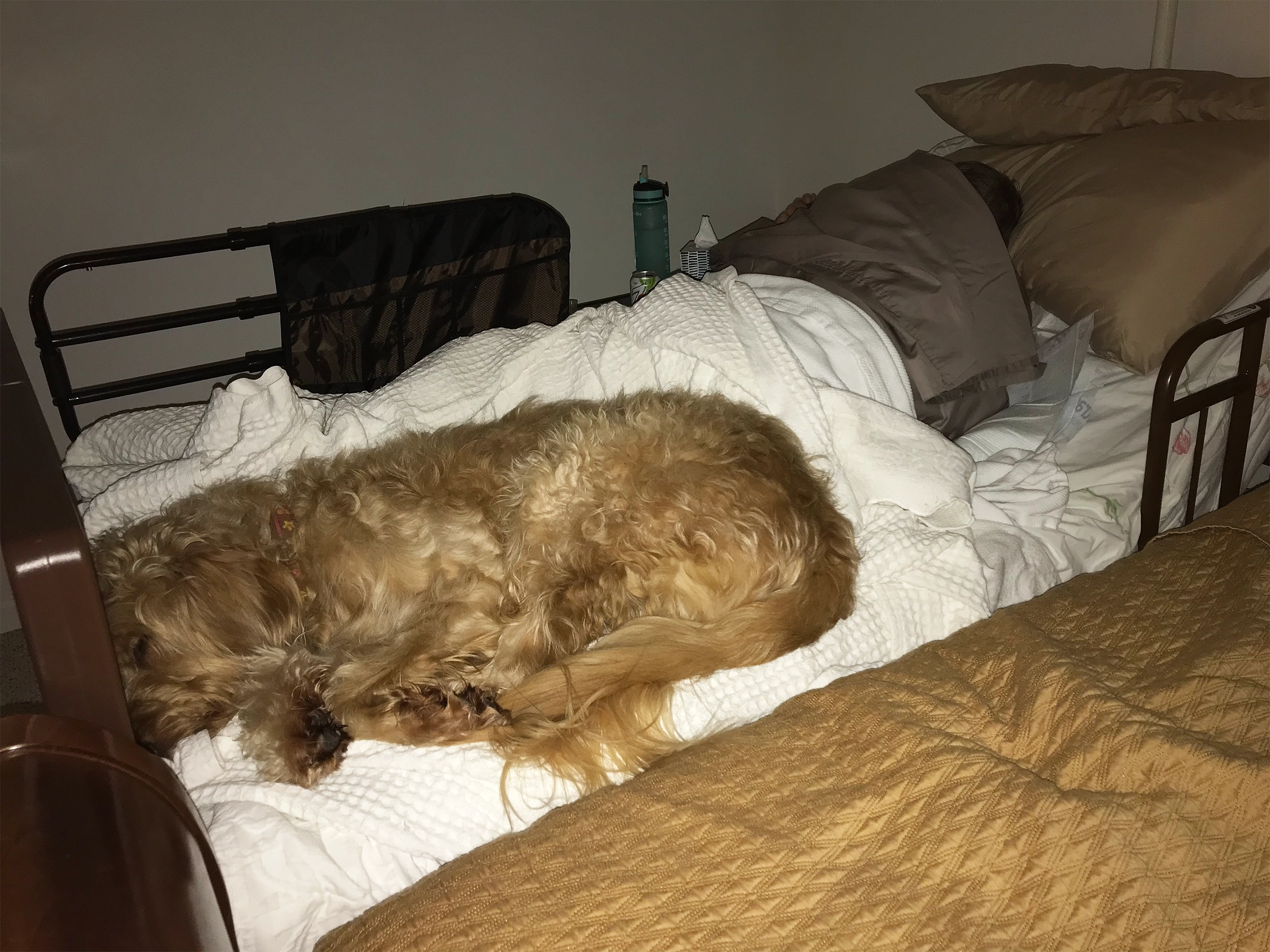
Deciphering the Clinginess: A Deeper Connection
These tender moments with Gunner make me reflect on a bigger question: “Why is my Goldendoodle so clingy?”
From what I’ve gathered, it’s not merely about attachment or seeking comfort. For Goldendoodles like Gunner, it’s a manifestation of trust, deep connection, and an unspoken bond that transcends words.
Their clinginess is, in many ways, their love language, and it’s truly a privilege to experience it firsthand.
Final Thoughts on Why is my Goldendoodle so Clingy
“Why is my Goldendoodle so clingy?” – a question that we’ve unraveled from various angles, including the breed’s traits and personal experiences like those with Gunner.
Goldendoodles, with their inherent loyalty and affection, often display attachment behaviors. While it’s vital to appreciate these moments, it’s equally crucial to encourage independence.
Training, positive reinforcements, and consistency are the keys. Let’s cherish the quirks, navigate the challenges, and deepen our bond with these loving companions.
-

Coffee Mug – In Dog Coffees I’ve Only Had One
Price range: $11.95 through $14.95 Select options This product has multiple variants. The options may be chosen on the product page
